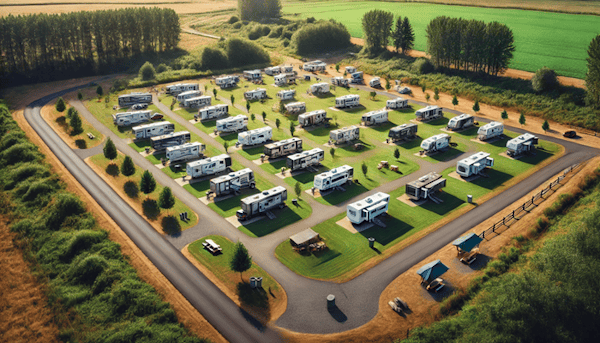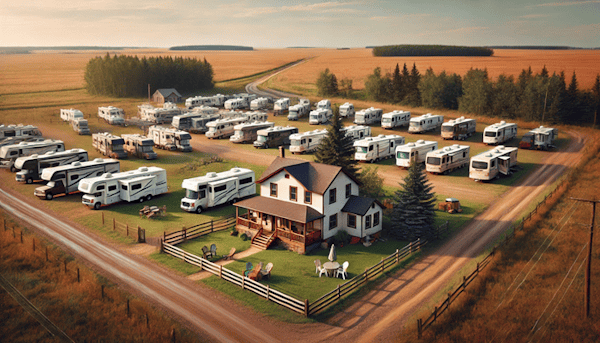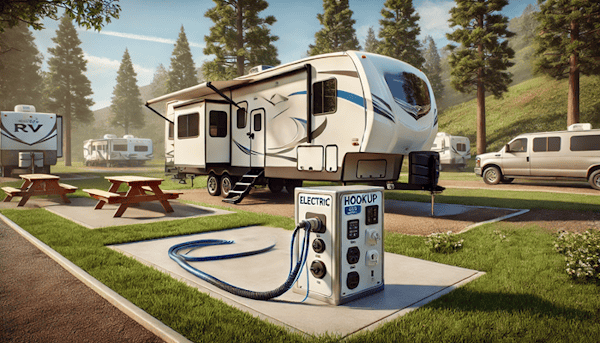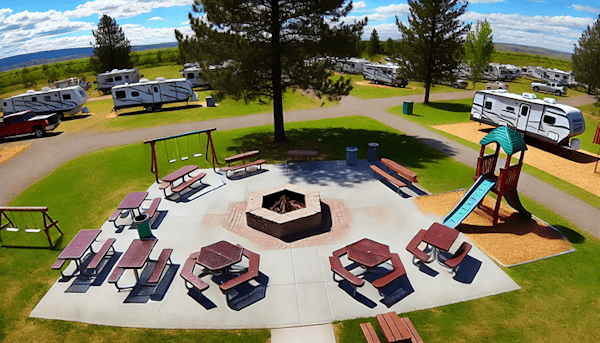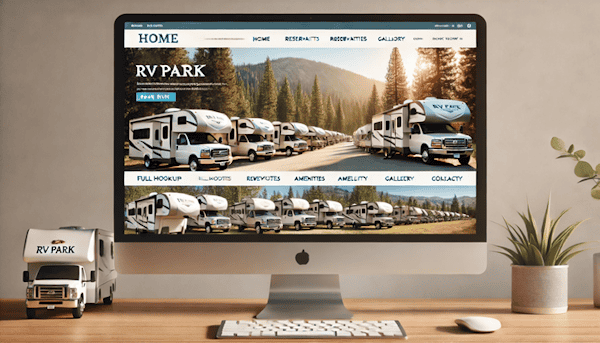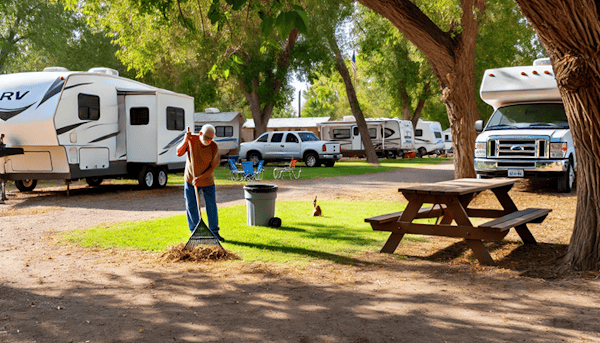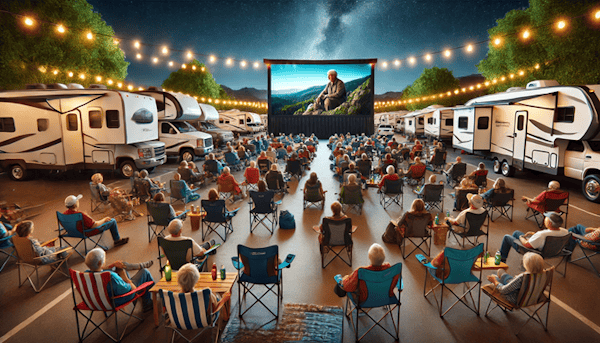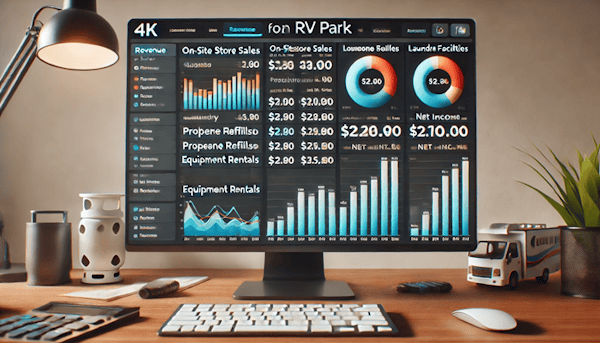Retirement Campground Business: Turning Your Property into a Camper’s Haven
Have you ever dreamed of turning your backyard into a money-making retirement campground business? Well, buckle up, because we’re about to take you on a journey that’ll make your retirement years not just golden, but downright adventurous! Welcome to the world of RV hosting – where your extra land becomes a hot spot for happy campers and your bank account gets a hefty boost.
Picture this: you’re sipping your morning coffee, watching the sun rise over a field dotted with RVs, and knowing that each one of those campers is adding to your retirement fund. Sounds pretty sweet, right? That’s the magic of starting a campground business in retirement. It’s not just a side hustle; it’s a whole new way of life that combines the joys of meeting new people with the satisfaction of being your own boss.
But here’s the kicker – you don’t need to be a camping expert or a business whiz to make this work. All you need is some land, a bit of elbow grease, and the insider tips we’re about to share. So, grab a seat by the virtual campfire, and let’s dive into how you can transform your property into an RV paradise that’ll have campers lining up and your retirement savings growing faster than you can say “s’mores”!
Understanding the RV Park Industry
Before we get into the details of starting your own RV park, you need to understand the industry. The RV park and campground business is growing and can be great passive income in retirement. more and more people are RVing.
Current Trends in the RV Park Industry
The RV park industry is constantly evolving. Recent trends include:
Glamping: Many RV parks are now offering luxury camping options to attract a wider audience.
Eco-friendly practices: Sustainable operations are becoming increasingly important to environmentally conscious travelers.
Technology integration: From contactless check-ins to smart campsite features, technology is reshaping the camping experience.
Workamping: With more people working remotely, RV parks are adapting to accommodate digital nomads with better Wi-Fi and dedicated workspaces.
Understanding these trends can help you position your retirement RV Park business for success and appeal to a broader range of campers.
The RV Park Market: A Big Opportunity
The RV industry has blown up in recent years with record sales of recreational vehicles. That means there’s more demand for good RV parks. As an RV park owner you’re getting into a big market.
Types of RV Parks: Find Your Niche
Not all RV parks are created equal. There are different types of parks for different demographics:
Luxury RV Resorts: High-end RV parks with extra amenities
Family-friendly Campgrounds: RV Parks with activities for all ages
Adult-only RV Parks: For retirees and older travelers
Seasonal Parks: Open only during peak travel months, offering a reliable income source with guaranteed paying guests, but also facing challenges like staff turnover and customer service
Year-round RV Parks: Open all seasons
Knowing these different models will help you succeed. As you start your campground ownership journey consider which niche fits your property and target market.
Is Retirement Campground Business a Good Investment?
Owning an RV park can be a lucrative investment opportunity, offering a steady stream of income and potential long-term appreciation in value. With the growing demand for RV travel and camping, RV parks are becoming increasingly popular, making them a viable investment option. However, it’s essential to conduct thorough research and consider various factors before making a decision.
Why RV Hosting is Your Ticket to a Rockin’ Retirement
Let’s face it – retirement isn’t what it used to be. Gone are the days of relying solely on a pension and Social Security. Today’s retirees are looking for ways to stay active, engaged, and yes, pad their bank accounts a little (or a lot). That’s where owning a retirement campground business comes in, and boy, is it coming in hot!
The Booming RV Industry
Did you know that the RV industry is absolutely booming? We’re talking over 11 million RV-owning households in the US alone. That’s a whole lot of RV owners looking for a place to park their home-on-wheels. And guess what? They’re willing to pay good money for a slice of your backyard paradise.
Perfect Fit for Retirees
But why is owning a campground business in retirement such a perfect fit for retirees? Well, for starters, it’s flexible. You’re not tied to a 9-to-5 grind. You can scale up or down depending on how much time and energy you want to put in. Plus, it keeps you active and social – two key ingredients for a happy, healthy retirement.
Financial Perks of Campground Ownership
And let’s not forget the financial perks. With minimal startup costs (especially if you already own some land), you can create a steady stream of income that’ll make your golden years truly shine. It’s like having a pension plan that also lets you meet interesting people from all walks of life. Many RV park owners find that their campground business provides a significant source of passive income, especially once it’s well-established.
Creating a Business Plan for RV Park Owners
A well-crafted business plan is essential for RV park owners to succeed in the competitive RV park industry. A business plan should outline the park’s mission, goals, target market, marketing strategies, financial projections, and operational plan.
Is Your Property RV-Ready? Let’s Find Out!
Now, before you start picturing your land filled with happy campers, we need to do a little reality check. Is your property actually suited for RV hosting? Don’t worry – you don’t need a massive ranch or a perfectly manicured landscape. But there are a few key things to consider. RV park owners often face challenges in site development and ensuring the property is RV-ready.
Size and Space Requirements
First up, size matters – but maybe not in the way you think. Even a couple of acres can be enough to start a small RV park. The key is to make sure you have enough space for RVs to maneuver safely. Remember, these aren’t tiny cars we’re talking about!
Land Features and Attractions
Next, think about your land’s features. Do you have a nice mix of sun and shade? Any scenic views or natural attractions nearby? These can be major selling points for potential campers. A babbling brook or a patch of woods can turn your ordinary backyard into an RV camping hotspot.
Zoning and Legal Considerations
But here’s the not-so-fun part (don’t worry, it’ll be over quick): zoning laws. Yeah, I know, snooze fest. But trust me, this is important. Before you invest a single penny, check with your local authorities about zoning regulations. Some areas have restrictions on running a campground business, while others might require special permits. It’s better to know this upfront than to get a nasty surprise later. Campground owners often face significant challenges in navigating these zoning laws and obtaining the necessary permits, which can impact their financial planning and overall business strategy.
Finding the Perfect Location for Your RV Park
The location of an RV park is critical to its success. When searching for the perfect location, consider the following factors:
Accessibility: The park should be easily accessible from major highways and roads. Campers don’t want to navigate tricky backroads to reach their destination.
Visibility: The park should be visible from the road to attract passing traffic. A well-placed sign can catch the eye of potential campers.
Amenities: The park should be located near amenities such as restaurants, shops, and attractions. Proximity to local attractions can make your park more appealing.
Zoning: The park should be located in an area zoned for RV parks or campgrounds. Check local zoning laws to ensure you’re in the clear.
Environmental Factors: The park should be located in an area with minimal environmental concerns, such as flooding or soil instability. A safe, stable location is crucial for long-term success.
Essential Amenities: What RV Campers Really Want
Now, let’s talk about what’ll make your RV campground the talk of the town (in a good way). RV campers might be roughing it, but they still expect certain amenities. Don’t panic – we’re not talking about building a five-star resort here.
Basic RV Site Essentials
The basics are pretty simple:
Electrical hookups (30 and 50 amp options are ideal)
Water connections
A way to dump waste (yep, we’re talking sewage)
A level spot to park
Amenities That Set You Apart
But if you want to stand out from the crowd, consider these extras:
Wi-Fi (because even campers need to post their adventures on Instagram)
A small camp store (for those midnight s’mores emergencies)
Clean bathrooms and showers (trust me, your campers will thank you)
A common area for gatherings (think picnic tables and fire pits)
Remember, you don’t need to have all of these right off the bat. Start with the basics and build up as you go. Your campers will appreciate the improvements, and you’ll learn what works best for your specific site.
Luxury Amenities for the Discerning Camper
While basic amenities are crucial, some RV parks are taking it to the next level with luxury offerings:
Swimming pools and hot tubs
Fitness centers or outdoor gym equipment
Dog parks and pet washing stations
Outdoor game areas (horseshoes, bocce ball, etc.)
Community gardens
On-site massage or spa services
Remember, you don’t need to implement all of these at once. Start with what makes sense for your budget and target audience, and gradually add more as your business grows.
From Dream to Reality: Setting Up Your Retirement Campground Business
Alright, so you’ve got the perfect spot and you know what amenities you need. Now comes the fun part – turning that vision into reality! It’s time to roll up your sleeves and get to work (or hire someone to do it for you – hey, you’re retired after all!). Campground owners often face challenges in the setup process, including securing proper funding, detailed business planning, and managing the capital required for site development and operational needs.
Creating Your RV Oasis: Site Planning 101
First things first – you need a plan. Grab a piece of paper (or fire up that computer if you’re tech-savvy) and start mapping out your campground. Think about:
Where each RV spot will be
How RVs will get in and out (remember, these are big rigs!)
Where you’ll put common areas like fire pits or picnic spots
The best spots for bathrooms and other facilities
Don’t forget about regulations – many areas have rules about how close RV spots can be to each other and to property lines. A little research now can save you a big headache later.
Utility Installation: The Not-So-Glamorous Side of RV Hosting
Now for the nitty-gritty – utilities. This is where things can get a bit complicated (and expensive), but don’t let that scare you off. Start with the basics:
Electrical hookups: You’ll need a licensed electrician for this. Each RV spot should have its own electrical box with different amp options.
Water connections: This might involve digging trenches and laying pipes. Make sure you’re using materials that can withstand your local climate.
Sewage system: This is crucial. You’ll need a way for RVs to dump their waste, whether it’s individual sewer hookups or a central dump station.
Wi-Fi: In today’s connected world, this is almost as important as water and electricity. Consider setting up a robust Wi-Fi system that can handle multiple users.
Yes, this part can be costly. But think of it as an investment in your future. Good utilities will keep campers coming back year after year.
Making It Cozy: Developing Common Areas
Now for the fun part – creating spaces where your campers can relax and socialize. This is what turns a basic parking lot into a true camping experience. Consider adding:
A central fire pit for evening gatherings
Picnic tables scattered throughout the campground
A small playground if you want to attract families
Walking trails if you have the space
Remember, the goal is to create a place where people want to spend time, not just park their RV for the night.
Spreading the Word: Marketing Your RV Campground
You’ve built it, but will they come? That’s where marketing comes in. Don’t worry – you don’t need to be Don Draper to get the word out about your awesome new RV campground.
Your Campground’s Online Home: Building a Website
First things first – you need a website. In today’s digital age, if you’re not online, you might as well be invisible. But don’t panic if you’re not a tech wizard. There are plenty of user-friendly platforms like Wix or Squarespace that make building a website a breeze.
Your website should include:
Clear photos of your campground (show off those beautiful spots!)
A list of amenities
Pricing information
An easy-to-use booking system
Directions to your location
Remember, keep it simple and easy to navigate. Your future campers will thank you.
Implementing Online Reservations
In today’s digital age, offering online reservations is a must. The vast majority, or 90 percent, of millennials prefer to reserve their travel experiences online. It not only makes life easier for your campers but also streamlines your booking process. There are many campground-specific reservation systems available that can integrate with your website, making it easy for campers to book their stay and for you to manage your occupancy.
Social Media: Your New Best Friend
Next up – social media. This is where you can really show off your campground’s personality. Post photos of happy campers, share local attractions, and give potential visitors a taste of what they can expect.
Focus on platforms where your target audience hangs out. Facebook is great for reaching retirees and families, while Instagram can attract younger, adventure-seeking campers.
Get Listed: Camping Directories and Apps
Don’t forget to list your campground on popular RV and camping directories. Sites like Good Sam, Campendium, and RV Trip Wizard are go-to resources for many RV enthusiasts.
Also, consider getting your campground listed on camping apps like The Dyrt or Hipcamp. These can put your campground business in front of a whole new audience of tech-savvy campers.
The Daily Grind: Managing Your Campground Business in Retirement
Congratulations! Your campground is up and running. But the work isn’t over yet. Now comes the day-to-day management. Don’t worry – it’s not as daunting as it sounds.
Keeping Things Running Smooth
Your daily tasks might include:
Checking in new campers
Making sure utilities are working properly
Cleaning common areas and bathrooms
Answering questions and addressing any issues
Pro tip: Create a welcome packet for new arrivals. Include campground rules, local attractions, and emergency contact information. It’ll save you time and help campers feel more at home.
Handling Bookings: To Tech or Not to Tech?
When it comes to reservations, you have options. You can go old school with a phone and paper system, or embrace technology with online booking software.
Online systems can save you time and reduce errors. Plus, many campers prefer the convenience of booking online. But if you’re not comfortable with technology, don’t force it. A friendly voice on the phone can be just as effective.
The Customer Service Dance
Remember, you’re in the hospitality business now. Good customer service can turn one-time visitors into loyal, repeat customers. A few tips:
Always greet campers with a smile
Be responsive to concerns and complaints
Go the extra mile when you can (like helping with directions or recommending local restaurants)
Campground owners face numerous challenges in providing excellent customer service, including the financial aspects of starting and maintaining a campground business, which require proper funding, business planning, and capital to navigate site development, customer service, and operational hurdles.
Finding the Work-Life Balance
One of the best things about an retirement campground business is the flexibility. But it’s important to set boundaries. Decide on your “office hours” and stick to them. Make sure you’re taking time for yourself and your own adventures.
Taking It to the Next Level: Expanding Your RV Empire
Once you’ve got the basics down, you might start thinking about ways to grow your business. Here are some ideas to take your campground from good to great:
Adding Value: Extra Services for Happy Campers
Think about services you can offer to make your campers’ stays even better:
Firewood delivery
Local tour guides
RV washing and maintenance
On-site food truck or small café
These extras can boost your income and make your campground stand out from the competition.
Event Central: Hosting Gatherings and Themed Weekends
Want to attract more campers and create a real community vibe? Try hosting events! Some ideas:
Outdoor movie nights
Holiday celebrations
Local music performances
Craft workshops
These events can turn your campground into a destination, not just a stopover.
Team Up: Partnering with Local Businesses
Don’t forget about the power of collaboration. Partner with local businesses to offer discounts or special packages to your campers. This could include:
Local restaurants
Adventure outfitters (for kayaking, hiking, etc.)
Museums or other attractions
It’s a win-win – your campers get a great deal, and you support your local community.
Financial Considerations for a Campground Business in Retirement
Starting an successful RV park business requires financial planning. Let’s break it down.
Initial Investment and Ongoing Costs
The cost to start an RV park can vary greatly depending on location, size and amenities. You’ll need to factor in land purchase, infrastructure development and setup. Don’t forget ongoing costs like utilities, maintenance and staff salaries.
Revenue Streams and Pricing
On-site store sales
Laundry facilities
Propane refills
Equipment rentals
Pricing your sites right is key. Research local market and consider seasonal pricing to maximize your occupancy and revenue.
Cash Flow
Cash flow is critical since RV parks have seasonal fluctuations. Plan for slow periods and consider offering incentives for extended stays or off season bookings to keep cash flowing.
Tax Benefits of an RV Park
Owning a successful RV campground business has several retirement tax benefits. Depreciation on improvements, deductions for operating expenses and potential property tax benefits can all add up to a better tax situation. Talk to a tax pro to understand and use these benefits.
Funding and Financing Options for RV Park Development
There are various funding and financing options available for RV park development, including:
Personal Savings: Using personal savings to fund RV park development can provide a low-cost financing option. It’s a great way to invest in your future without taking on debt.
Bank Loans: Banks offer a variety of loan options for RV park development, including construction loans and permanent financing. Shop around for the best rates and terms.
SBA Loans: The Small Business Administration (SBA) offers loan programs specifically designed for small businesses, including RV park development. These loans often come with favorable terms and lower interest rates.
Investors: Private investors may be interested in investing in RV park development projects. Partnering with investors can provide the capital you need to get started.
Grants: Government grants may be available for RV park development projects that meet specific criteria, such as environmental sustainability or economic development. Research available grants to see if you qualify.
It’s essential to carefully evaluate each funding option and consider factors such as interest rates, repayment terms, and collateral requirements before making a decision. With the right financing, you can turn your dream of owning an RV park into a reality.
Navigating Challenges in Your RV Park Business
Like any retirement business venture, running a campground business comes with its share of challenges. Being prepared can help you navigate these obstacles more effectively.
Seasonal Fluctuations
Many RV parks experience high season during summer months and holidays, with slower periods in between. To combat this:
Develop off-season marketing strategies
Offer special rates or packages during slower periods
Host events or themed weekends to attract visitors year-round
Weather-Related Issues
Outdoor businesses are at the mercy of Mother Nature. Prepare for:
Extreme weather events (have an emergency plan in place)
Maintenance issues caused by weather (e.g., muddy roads after heavy rain)
Landscaping challenges in different seasons
Regulatory Compliance
Staying on top of regulations is crucial. Keep abreast of:
Local zoning laws and any changes
Health and safety regulations
Environmental protection requirements
Customer Satisfaction
In the age of online reviews, maintaining high customer satisfaction is more important than ever:
Regularly solicit and act on feedback
Train staff in customer service excellence
Be responsive to complaints and resolve issues promptly
By anticipating these challenges, you’ll be better equipped to handle them when they arise, ensuring the long-term success of your retirement campground venture.
Conclusion: Your RV Hosting Adventure Awaits
And there you have it – your plan to turn your property into a camper’s paradise and start your retiree RV hosting business. Remember, this is a marathon not a sprint. Start small, learn as you go and don’t be afraid to adjust.
RV hosting is more than a business opportunity – it’s a chance to make memories, build a community and share your little piece of heaven with others. And let’s be real, it’s a pretty cool way to spend your retirement.
Now get to it! Be your campground host. Fire up the grill, dust off those campfire stories and get ready to welcome a whole new world of adventure in your own backyard. Your RV hosting journey starts now – and I promise it’s going to be fun!
FAQs
Q: How much land do I need for an RV campground? A: You can start with 2-3 acres but more land means more sites and amenities. Even a small plot can accommodate 5-10 RV’s to get you started.
Q: What are the basic utilities I need to provide for RV campers? A: The essentials are electrical hookups (30 and 50 amp), water connections and a sewage dump station. Wi-Fi is nice to have in today’s world.
Q: Do I need special insurance to run an RV campground? A: Yes, you’ll need commercial liability insurance for campgrounds. This will protect you in case of accidents or injuries on your property.
Q: How much can I charge per night for an RV spot? A: Rates vary widely depending on location, amenities and season. On average you can charge $25 to $75 per night, premium spots or busy season will command higher rates.
Q: Are there any legal requirements to start an RV campground? A: Yes, you’ll need to check local zoning laws, get necessary business licenses and make sure you meet health and safety regulations. Some areas may require special permits for campground operations.
Disclosure: Some of the links in this article may be affiliate links, which can provide compensation to us at no cost to you if you decide to purchase. This site is not intended to provide financial advice. You can read our affiliate disclosure in our privacy policy.

